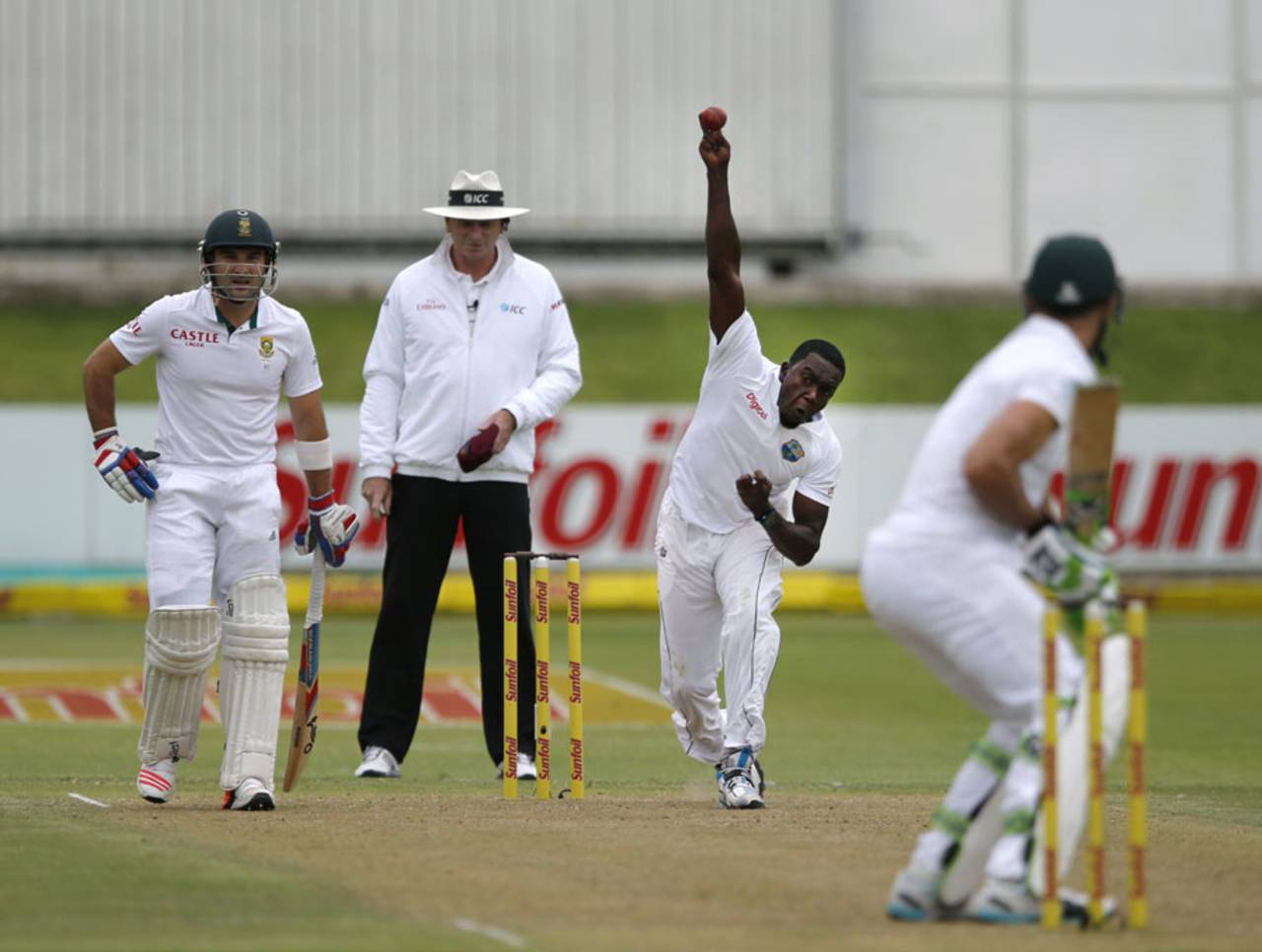If progress is defined solely as being better than yesterday, then West Indies' bowlers have definitely made some between the first and second Tests. Their attack demonstrated a discipline which was lacking at SuperSport Park. But progress in a team sport is also measured by whether that improvement had any effect on the opposition and on that front, West Indies have not moved forward as much. They still could not find a way through South Africa's line-up and their only success came through errors from the opposition.
The two wickets they claimed came from Alviro Petersen, a man out of form who seems to intent to chase the end of his international career, and
Dean Elgar, who spent five-and-a-half hours grinding out a century before his concentration nodded off for a second. Neither of these dismissals justified the decision Denesh Ramdin made to field first on a surface West Indies appeared to be unsure of.
At least the opening pair began better than they did in the first Test. Jerome Taylor, who sprayed the ball in more directions in Centurion than the musical fountains at the nearby casino during the south-western wind, started on target and even induced the edge with his first delivery. He found the fuller length he could not conjure up in Centurion and bowled a tighter line which made the batsmen play more frequently. He veered from that only twice in his opening spell - when he tried a bouncer that flew for five wides and attempted a yorker that became a low full-toss - before quickly realising that the best approach was the conservative one.
At the other end, 32-year-old debutant Kenroy Peters also operated within his limitations. With pace that barely got over 130kph, he used angle and accuracy. Although he did not threaten, he offered more consistency than the other left-arm pacer in the West Indian squad, Sheldon Cottrell, who was in action last week.
West Indies could have continued in that fashion all day and South Africa may have ended on 200 without loss. In general, the South African batsmen have the temperament to win the patience game. It showed when Elgar and
Faf du Plessis showed an awareness of their off stump and the ability to leave even those deliveries that came dangerously close to disturbing them.
The only South African who has not achieved the same recently is Petersen, as his shot selection abandoned him again. His dismissal for 17 has taken his run of innings without a Test century to 25 and his scores of under 30 in that time to 18. South Africa's selectors should now be forced to look elsewhere. They only need to glance down the order where Stiaan van Zyl is sitting, for a starting point.
Petersen's late Christmas present lifted West Indies considerably. In the nine overs that followed, they gave only 10 runs and applied pressure on both ends. Jason Holder found movement in to Elgar, had an lbw shout against him and had him in doubt about which way to move.
Du Plessis seldom experiences similar uncertainty. His vigils in Adelaide and Johannesburg are testament to that. Although he was also tested by awkward lift - more the result of Holder's height than any semblance of extra bounce in the surface - he did not fail any examination put in front of him. Not even when Ramdin reintroduced the leader of his attack, Taylor, who ended a first session West Indies would not have been too unhappy with.
The work they did in the morning could have paid off in the afternoon when Taylor beat Elgar's bat and then induced the edge from du Plessis. Marlon Samuels at gully, however, could not complete his end of the deal. Neither could Devon Smith at slip, nine overs later, when du Plessis, after being watchful against Sulieman Benn, was lured down the track and edged again. Ramdin missed a chance, too, off the next ball, when Elgar jumped out of his crease and gave ample opportunity for the stumping.
In that period of play, West Indies could have demonstrated real progress. They could have shown something beyond just the ability to contain, which they went on to do until weary legs took over. They could have had a say in the day's play rather than allowing South Africa to make the big statements.
In Elgar, they came against one of the most defiant orators and in du Plessis, one of the most eloquent. Elgar wanted to prove something: that he could fight through a start to convert his score into something substantial. "It's something which I have been fighting with myself for the last three games," he said. Since he scored
that century in Galle, in other words. As a new opener, Elgar knows that a string of solid scores will go some way towards cementing his place, especially as his opening partner struggles.
After a duck in the first Test, du Plessis also felt he owed the team some runs. Through his signature style of watch, wait, watch, wait, watch, wait and score a run, he is on the brink of his fourth Test century. By implication, West Indies have gone from a day of decent execution to staring down the barrel of another big total. This time, they have their own limited progress to blame.
Firdose Moonda is ESPNcricinfo's South Africa correspondent
